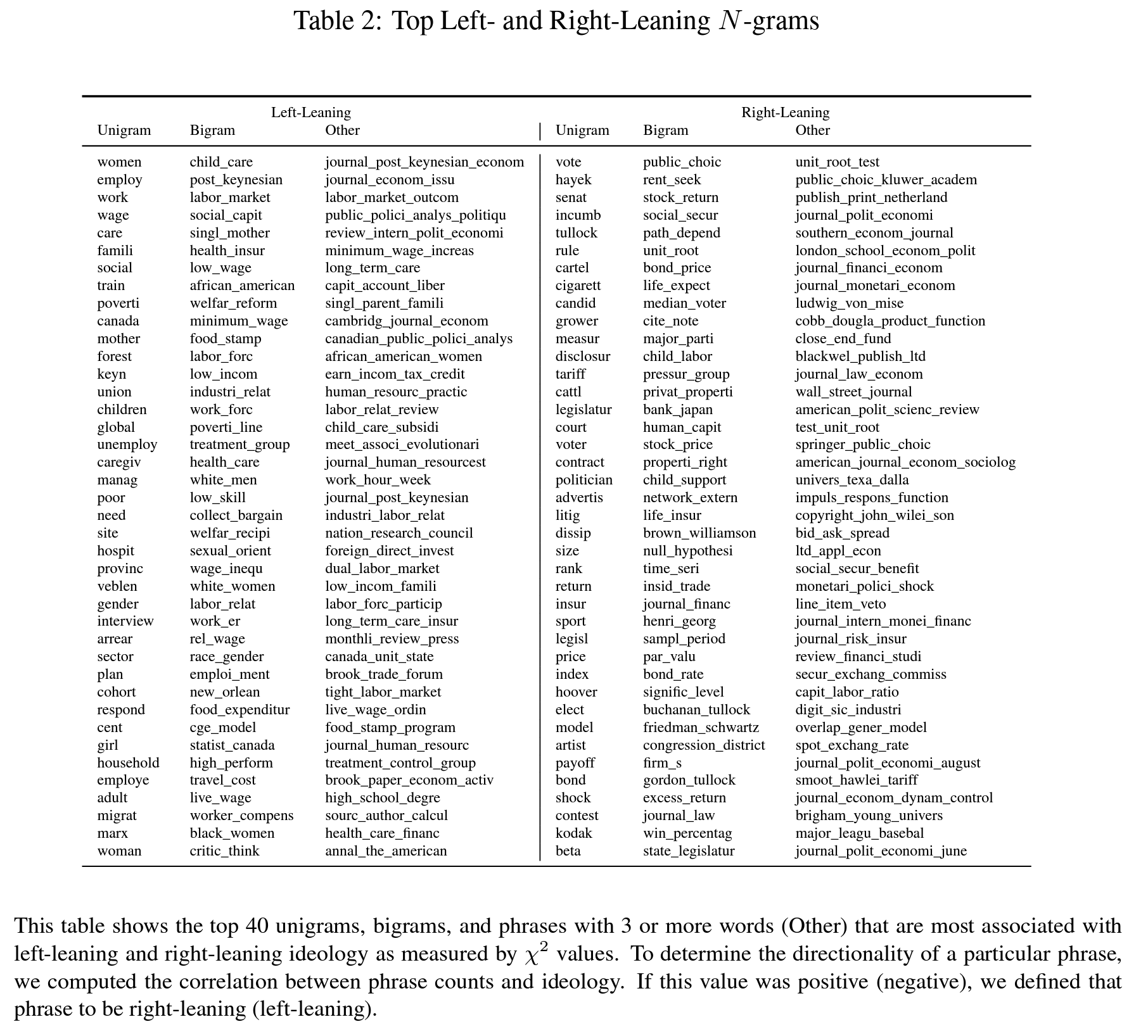Political bias in economics
« previous post | next post »
Zubin Jelveh, Bruce Kogut, and Suresh Naidu, "Political language in economics", The Economic Journal:
Abstract: Does academic writing in economics reflect the political orientation of economists? We use machine learning to measure partisanship in academic economics articles. We predict observed political behavior of a subset of economists using the phrases from their academic articles, show good out-of-sample predictive accuracy, and then predict partisanship for all economists. We then use these predictions to examine patterns of political language in economics. We estimate journal-specific effects on predicted ideology, controlling for author and year fixed effects, that accord with existing survey-based measures. We show considerable sorting of economists into fields of research by predicted partisanship. We also show that partisanship is detectable even within fields, even across those estimating the same theoretical parameter. Using policy-relevant parameters collected from previous meta-analyses, we then show that imputed partisanship is correlated with estimated parameters, such that the implied policy prescription is consistent with partisan leaning. For example, we find that going from the most left-wing authored estimate of the taxable top income elasticity to the most right-wing authored estimate decreases the optimal tax rate from 84% to 58%.
A non-paywalled draft is here.
The economist who sent me the link commented "Shocking, I tells ya!"
The analysis techniques are rather old-fashioned (the Porter stemmer, stem ngrams, Chi-Square (χ2) statistics — not a deep net in sight!). Still (maybe for that reason?) the analysis seems solid to me, as far as it goes.
Anyhow, my favorite part is "Table 2: Top Left- and Right-Leaning N-grams" (p. 43):
Some of the connections to word-stems are intuitive — women, employ, wage on the left; hayek, contract, hoover on the right.
But others are more puzzling, especially on the right. Why are cartel, cigarett, and cattl right-associated unigrams? What about the bigrams social_secur, bond_price, child_labor? Or the trigrams impuls_respons_function, line_item_veto, major_leagu_basebal?

D.O. said,
May 17, 2024 @ 1:17 pm
I think, most differences are well explained by 2 top line bigrams, "child care" and "public choice". "Cattle" is a bit of a mystery. Right-leaning economists are more interested in farming? Or maybe it's a single very dedicated person.
David P said,
May 17, 2024 @ 7:27 pm
Perhaps cattle come from Ronald Coase. From the Wikipedia article on Coase:
" 'The Problem of Social Cost' provided the key insight that it is unclear where the blame for externalities lies. The example he gave was of a rancher whose cattle stray onto the cropland of his neighbour. If the rancher is made to restrict his cattle, he is harmed just as the farmer is if the cattle remain unrestrained."
Philip Taylor said,
May 18, 2024 @ 2:23 am
" The example he gave was of a rancher whose cattle stray onto the cropland of his neighbour. If the rancher is made to restrict his cattle, he is harmed just as the farmer is if the cattle remain unrestrained" — a very strange conclusion, IMHO. I cannot see how the rancher is harmed by being made to restrict his cattle, any more than I am harmed by being made to restrict my car’s speed to the legal speed limit — he is simply being made to constrain his cattle to graze on his land, not on that of his neighbours.
Seth said,
May 18, 2024 @ 8:21 pm
@ Philip Taylor – I think "harmed" in this case is being used in a jargon sense of "needs to pay". The idea is basically someone has to suffer a loss somewhere – either the farmer gets crop destroyed, or the rancher needs to pay the cost of something to keep the cattle confined. It's not being used in a moral sense.